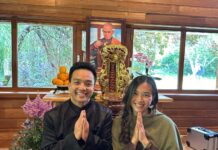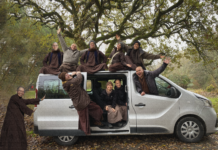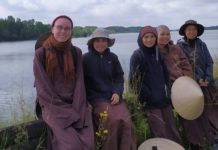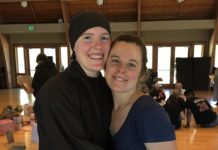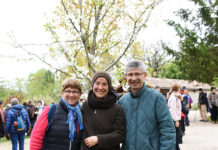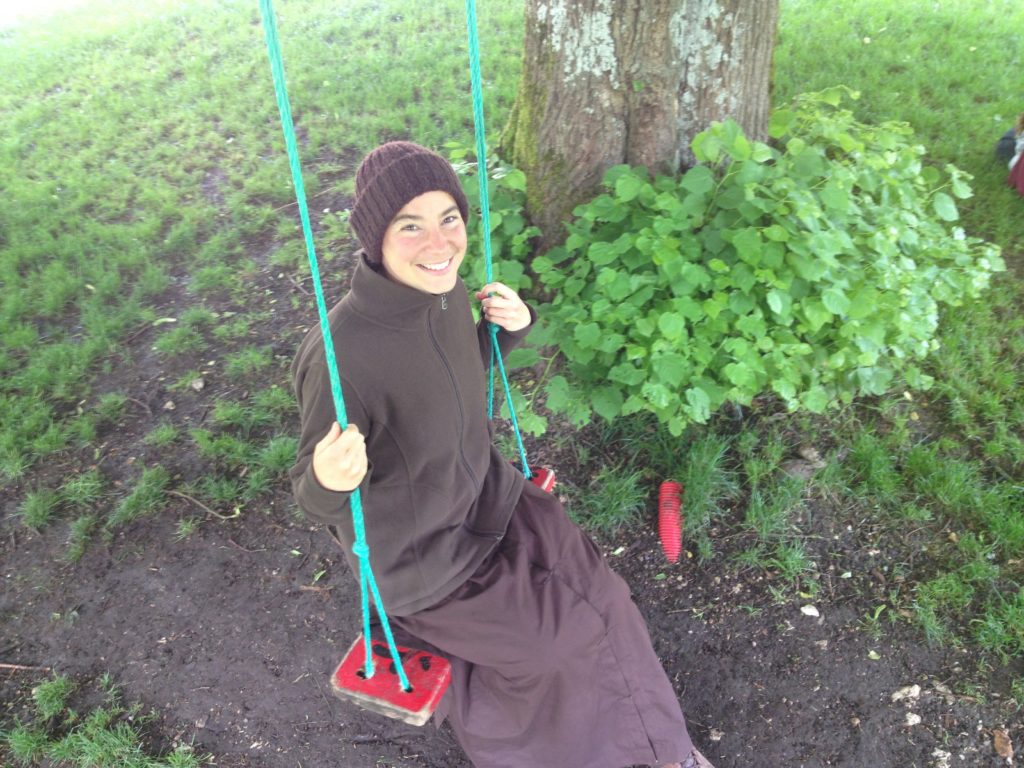
Sister Giác Hòa (Awakened Harmony) from New Hamlet, Plum Village, shares about committing to the Five-Year Monastic Program and how her practice as a nun supports her family.
Q: What was your aspiration to do the Five-Year Monastic Program?
Sister Giác Hòa: I found the openness of the community to bridge between the eastern and the western cultures, and the possibility for young people to explore a monastic path beautiful. To be able to do the Five-Year Monastic Program in the time it takes to earn a Master’s Degree is a wonderful way to step and ease into the practice.
For me, I would say it is difficult for members of my generation to commit to things. Even though I felt this was a path I wanted to explore and commit to, it was easier for my mind to accept the idea for a shorter time period with the possibility to commit to a longer monastic path at the end of the 5-year term. It was also easier for my family to understand that I was not going to do something for eternity. It gave them a specific time frame, and therefore it was easier for my family to accept my choice.
Q: Do you notice any difference between practicing as a monastic and as a lay person?
Sister Giác Hòa: Yes. As a monastic, I am within a Sangha that practices continuously. The practice is our lifestyle, and it sustains our life. When I was a lay person, I went to my Sangha Maison de l’Inspir a lot for one year.
Once there was a session of Question and Answer. I think it was Sr. Dao Nghiêm who answered my question. I shared that it was difficult for me to practice sitting meditation alone at home, and she said, “Yes.” I compared it to going to the swimming pool. I like to swim. Even though I liked swimming and saw it was good for me, I often didn’t go. It was easier to go with a friend rather than to motivate myself to go for a swim. Sr. Dao Nghiêm told me, “Yes, it is the same. It is easier to motivate yourself to practice when you are with others.”
In the monastic Sangha. we live together. We just go from our room, whom I share with other sisters, to the meditation hall for morning sitting. We just have to follow the schedule, and this actually makes things easier. There is no mind in it, no reflection, no thinking. I feel free because I don’t have to think about what I do. When I start thinking, more thinking comes. “Is it fair?” “Is it right?” “Is this a good moment?” Then I start organizing things in my mind before getting up from bed. Now I just do it.
As a monastic, I am within a Sangha that practices continuously. The practice is our lifestyle, and it sustains our life.
As a lay person, I remember it was difficult for me because I wanted to practice well, and I was not satisfied with my practice. I was not able to notice that I was already doing something. It was very important for me to attend the Sangha. I noticed the difference when I tried to practice alone and when I practiced with the Sangha or a practice centre nearby. With no Sangha, I eventually lost the transmission of the Five Mindfulness Trainings and had to renew it.
Q: How has your way of perception changed since you joined the monastic community?
Sister Giác Hòa: I joined the monastic community by participating in the ordination ceremony. I had already received a lot of love from the Sangha as I prepared (together with a group of aspirants), and we became more and more a part of the monastic family. The ordination was such a big bath of love. I could feel a soft blanket of spiritual energy and support. With the chanting I felt that all of us were cradled by this love of the community.
If I had any perception at that moment, it would just melt because it was not a moment I could think or hold on to anything. I just let go, touched the earth and focused on my belly breathing to stay kneeling up. I was aware of my ancestors in me. My parents and my brother were there, and I could feel the ceremony was also for them. I felt I was going through the ceremony for all my ancestors. In my practice, I walk often with my grandparents and other ancestors; I find this healing. It makes me understand them more and how they are linked to me and I am linked to them. That day they were there in me, along with so many of my friends. I had their image in my mind and their presence in me.
As far as living in the community is concerned, I had experienced community living before. It was a joy and also a journey toward the unknown, something one cannot imagine until one experiences it. I can’t compare one community to another. We practice to cultivate our beginner’s mind and be open to everything. I remember as an aspirant, I was training to see with the eyes I had when I discovered Plum Village community for the first time.
I practiced to recognize that this is my habit or my perception, and just held its hand and walked together. I try to look deeply to see how the perceptions I have about others are conditioned. I see that they have been transmitted to me from my ancestors, my culture, my educational environment, etc.
We practice to cultivate our beginner’s mind and be open to everything.
The perceptions I have about things or people, ideas, and habits are here in me. The more I practice and live in such an international community and cultivate brotherhood and sisterhood, the more I see that they evolve every day. I learn ways to let go of my perceptions, look with different eyes and see that nothing remains the same around me and in my own mind. For this reason, fixed perceptions are always wrong.
Regarding my perceptions about monastic life, I think I was so unmindful. I was not aware of my perceptions when I started on this path. I think something bigger than me pulled me to this path. It was not based on thinking or something rational. It grew organically. Of course, perceptions are present and often lead us to make this or that decision, think or speak in such a way. I find that the practice helps me to become more aware of my perceptions and understand what they are made of. I can notice them, question them and allow them to change, so my heart can open. My life can be more awake and harmonious.
It is a nice training to see which perceptions arise under certain situations. They are hints for me to understand who I am, where things in me come from, and what I need to transform to be more free.
Interview conducted by Annica on 22nd February 2019 in New Hamlet, Plum Village, and transcribed by Joyce Bailey.



